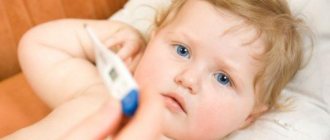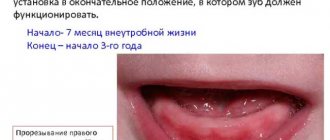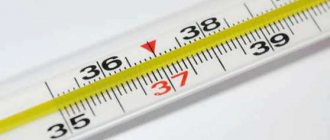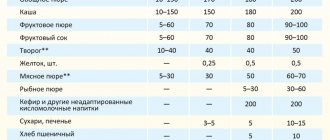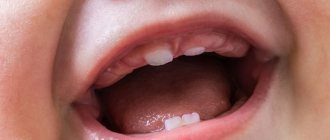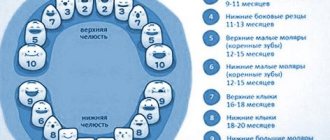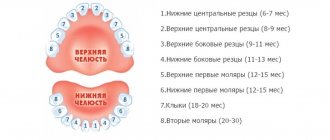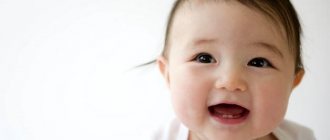The formation of baby teeth is a stressful situation for a baby, to which his body usually reacts with an increase in body temperature. Of course, this happens not only because of teething. It will be useful for many parents to know what to do when their baby suddenly has a fever.
What causes body temperature to rise during the formation of baby teeth?
There is a misconception that a child’s elevated body temperature during the eruption of baby teeth is not normal and therefore measures should be taken to lower it to a normal level. In fact, this is not so. The fact is that at the site of tooth eruption, the body’s immune defense decreases. Harmful bacteria enter the disturbed gum and cause an inflammatory process, which is always accompanied by an increase in body temperature. It should be understood that elevated temperatures have a detrimental effect on harmful microorganisms. Of course, this does not mean that excessively high temperatures during teething are normal.
Parents of the baby should not worry if, during the formation of baby teeth, the baby’s body temperature does not exceed 38 degrees.
In one-year-old babies, the process of tooth formation is much more complicated. It is after the first year of life that a child’s canines and molars begin to form. These teeth erupt much more slowly and, accordingly, increased body temperature can persist for a long time. Their long formation is explained by the uneven shape of the molars and their size. Sometimes it lasts several weeks.
The same situation occurs during the eruption of eye teeth. Their roots are located much deeper than the rest of the baby's teeth. Therefore, the growing eye tooth has to travel a longer path to the gum surface. All this time, the child experiences discomfort, and his body responds to it with an increase in body temperature.
In essence, the emerging baby teeth tear the soft tissue of the gums, and this cannot be painless. In this place, the immune defense is weakened due to injury. During the formation of molars, children often develop a fever. This happens when the impact of harmful microorganisms becomes too powerful, that is, an infectious infection has occurred. In this case, the body temperature rises to 38 degrees, and sometimes above.
How to deal with teething fever
Komarovsky himself excludes the use of medications without the consent of a doctor. Therefore, mom and dad have to act in gentle ways. If, in parallel with teething, an increase in temperature is observed, Komarovsky advises paying attention to the following points.
- First of all, the age of the child is taken into account. If teething occurs early, then it is not worth lowering the temperature until it reaches +38°C. The fact is that the baby’s body must learn to cope with such situations on its own. But Komarovsky warns that it is also important to monitor the condition. If convulsions or fever occur, it is necessary to reduce the temperature.
- When dealing with fever as teething occurs, it is important to keep your baby calm. There should be no active games. Also, do not rub it with vinegar or use other folk remedies. Komarovsky only allows the child to be wrapped in a cold sheet.
- If the temperature persists for a long time, do not hesitate to call a doctor. After all, sometimes it’s not about teething at all. And then you may miss the moment when urgent help is needed.
These are the most important aspects that need to be considered when a child has a fever due to teething. But how can you help your baby to get through this period easier? Dr. Komarovsky can recommend specific actions. They allow you to create the most favorable environment for your child.
What is the maximum permissible body temperature of a child during the formation of teeth?
How high a baby's body temperature can rise depends on the condition of his body. During teething, a normal body temperature is considered to be between 37.5 and 37.7 degrees. The maximum permissible temperature is 38 degrees. If it increases further, then measures should be taken to reduce it.
Parents should remember that during the period of formation of baby teeth, the child’s body temperature should be measured more often.
If the child’s body temperature reaches 39 - 40 degrees, this means that urgent medical attention is needed, since, most likely, the infection has penetrated the baby’s respiratory system.
How long can an elevated body temperature remain?
There is no clear answer to this question. It all depends on the health of the baby. As for the results of long-term observations, on average, the increased body temperature of a child during the formation of baby teeth persists for one to three days. It is important to note that when the top of the tooth appears above the surface of the gum, body temperature returns to normal. This happens as each tooth erupts.
However, statistics show that in some children, elevated body temperature persists for four or even five days, and the fever can last only a few hours and go away on its own.
Knowing all of the above does not mean that parents should not show their baby to pediatricians. An extra examination by a specialist will never hurt, but, on the contrary, will help identify diseases at the earliest stage of their development.
What symptoms can accompany high temperature?
During the period of teething, in addition to elevated temperature, the child may exhibit other symptoms. Often at this time, swelling of the gums occurs, which can reach the mucous membrane of the nose. This phenomenon is accompanied by a runny nose and copious discharge of clear fluid from the nose. Swelling most often occurs when the baby's upper teeth erupt.
If the elevated body temperature persists for five days, then you should immediately call a doctor.
You should also know that during teething, babies produce copious amounts of saliva. It is especially pronounced when the lower teeth erupt.
Warning symptoms
During the period of teething, the child’s body is weakened and therefore more susceptible to viral or bacterial diseases. At this time, you need to monitor your baby with maximum attention. You should seek help from a doctor if you have the following symptoms:
- The baby's nose is very stuffy and a purulent substance is released from it. Such signs indicate the likelihood of rhinitis, which can only be cured with medication.
- The appearance of diarrhea does not mean that it is directly related to teething. Most likely, an infection entered the child's stomach through toys or a gum teether. The baby should be shown to a doctor.
- During teething, the baby's mouth produces copious amounts of saliva. The child does not always have time to swallow it, and this causes him to cough, or rather, cough. If the cough becomes prolonged, this means that the baby’s respiratory system has become infected. You can’t do this without the help of a doctor.
- It should also be taken into account that teething cannot cause redness in the throat. If this happens, it means that the child has pharyngitis or a general respiratory disease.
- Vomiting at elevated body temperature during teething is an alarming signal. This happens when the nervous system is damaged or due to an intestinal infection. Calling a doctor in such a situation is mandatory.
All of the above symptoms are alarming, even if they appear without elevated body temperature.
Is immunity really developed?
There is no consensus on this matter.
It is believed that high temperature is the body’s response to the penetration of viruses, microbes, and bacteria into it. And the pyretic mechanism, which turns on at this moment, helps to literally “fry” all these harmful strangers. When are antipyretic medications needed? Many pediatricians advise parents to do the following - if the baby has a fever, and he tolerates it quite well, continues to do his work, plays and does not experience weakness - then antipyretics should not be given up to the maximum limit of 38.5 degrees.
If the baby is literally lying flat, and in previous cases of hyperthermia he had convulsions or vomiting, then the medicine must be given, and not wait for the number 38.5 on the thermometer.
Child's body temperature when replacing baby teeth with permanent ones
During the period of loss of baby teeth and the appearance of permanent teeth, the child’s body temperature remains normal. Only some children's body temperature rises when permanent molars begin to form. The reason for this is the size and shape of the molars.
Typically, children's first permanent teeth begin to form at the age of six. If at this time the child’s temperature rises, then there is a possibility of gingivitis. This disease is characterized by inflammation of the mucous membrane of the gums and requires treatment.
How should parents behave when their child’s body temperature rises?
Many parents, having discovered an increase in the child’s body temperature during the period of teeth formation, try to bring it down with antiviral or antipyretic drugs. Meanwhile, there is no need to rush in such a situation.
A body temperature within 37 degrees should not cause anxiety in parents, since this is the norm during teething, and more precisely, a normal protective reaction of the body. In such a situation, you just need to wait until the body itself copes with the pathogenic microorganisms that have penetrated it.
However, if the body temperature exceeds 38 degrees and the baby experiences attacks of fever, it is advisable to use antipyretic drugs. If this does not help, then the baby should be wrapped in a diaper soaked in a weak vinegar-alcohol solution or simply moistened with cool water.
If high temperature and fever attacks occur for three days, then a medical examination of the baby is necessary. He probably developed some kind of disease that had nothing to do with teething. It is allowed to use homeopathy instead of antipyretic drugs. These drugs cannot reduce body temperature, but at the same time significantly improve the general condition of the baby. This in turn contributes to a speedy recovery. However, the use of homeopathic medicines without the approval of a pediatrician is unacceptable.
How to measure temperature correctly
Before giving your daughter or son any medicine, you should make sure that the temperature has actually risen.
Thermometers help measure it, so they should be in your home medicine cabinet. The following methods can be used:
- 1. Use a regular glass mercury thermometer. And although this method is considered not fashionable today, it shows the most accurate numbers.
- 2. An ear thermometer is a good device for very young children, since you can get the result in just a few seconds, and no contact with the skin is required.
- 3. Digital ones are not as accurate as classic ones, but they are especially popular with parents of all ages.
- 4. Frontal ones are most often found in large clinics. This is very rare in home practice.
- 5. Thermometer - the pacifier will be an ideal assistant for mothers and fathers if the child is not yet a year old.
Each of the presented options works differently. Therefore, before you start using it, you should read the instructions.
Will walking during teething be harmful?
If during the period of teething the child’s body temperature does not exceed 37 degrees, and the baby himself does not suffer much from this, then walks will benefit him. In such a situation, the baby should be dressed for the weather and walked with him away from people to avoid possible infection. You should not get involved in active games at this time.
If the baby’s body temperature has risen above 37 degrees, and he himself does not feel well, then it is better to refrain from walking until he recovers.
In conclusion, let us remind you that self-treatment of children is always fraught with bad consequences. Do not hesitate to contact your doctor again.
Komarovsky: how to create better conditions for teething
We must proceed from the fact that the child during such a period urgently needs the help of his parents. When teething, Komarovsky calls a child’s temperature not a very dangerous phenomenon. But this is only true if the temperature does not reach particularly high levels. The latter situation cannot be avoided without the intervention of a doctor. In other cases, Komarovsky recommends giving up medications and following such advice.
- While teething is in progress, you need to take your baby for frequent walks. Moreover, it is better to take the baby out not in a stroller, but in a sling or a special backpack. This will provide the child with the contact with his mother that he incredibly needs.
- Playing with your baby during teething is also very important. If the temperature does not reach +38.5°C from simple games that do not involve serious expenditure of effort, there will definitely be no harm. This will help distract the child from unpleasant sensations.
- High temperatures always lead to rapid dehydration. Therefore, the child should be constantly provided with a sufficient amount of liquid, and also wiped with a damp swab or rag.
- Komarovsky also emphasizes that it is necessary to monitor the general temperature regime. The child should not be dressed in clothes that are too warm. And the temperature in the room should be maintained at a level of more than +18°C, but less than +25°C.
By following Komarovsky’s recommendations, you will be able to make the teething process less painful for your child. But do not forget that too high a temperature is a reason to call an ambulance. This cannot be put off.

